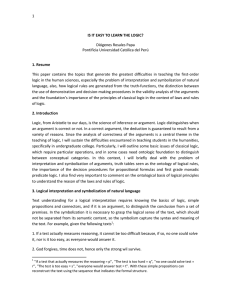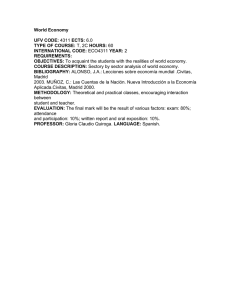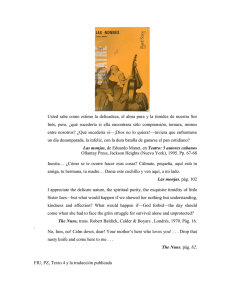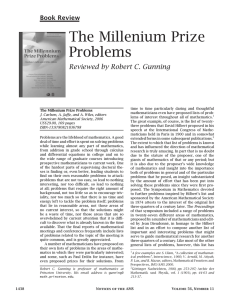Lógica - CM0260 Introducción
Anuncio
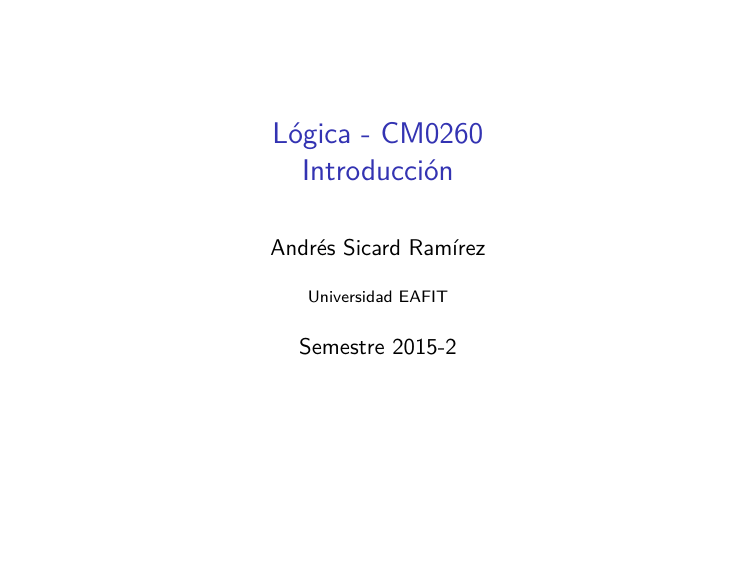
Lógica - CM0260 Introducción Andrés Sicard Ramírez Universidad EAFIT Semestre 2015-2 Información inicial Coordinador del curso de Lógica Manuel Sierra Aristizábal Jefe Departamento de Ciencias Matemáticas Myladis Rocío Cogollo Flórez Página web del curso http://www1.eafit.edu.co/asr/courses/logic-CM0260/ Evaluación, bibliografía y horarios de atención Ver la página web del curso. Lógica - CM0260. Introducción 2/15 Información inicial Prerrequistios El curso está diseñado para estudiantes que no tienen una formación en Lógica. Pacto pedagógico Lógica - CM0260. Introducción 3/15 ¿Qué es la Lógica? 1 2 Mendelson, Elliott (1997). Introduction to Mathematical Logic, pág. 1. Copi, Irving M. (1998). Lógica Simbólica, pág. 15. Lógica - CM0260. Introducción 4/15 ¿Qué es la Lógica? “One of the popular definitions of logic is that is the analysis of methods of reasoning.”1 1 2 Mendelson, Elliott (1997). Introduction to Mathematical Logic, pág. 1. Copi, Irving M. (1998). Lógica Simbólica, pág. 15. Lógica - CM0260. Introducción 5/15 ¿Qué es la Lógica? “One of the popular definitions of logic is that is the analysis of methods of reasoning.”1 “El estudio de la Lógica, entonces, es el estudio de los métodos y principios usados para distinguir entre los argumentos correctos (buenos) y los argumentos incorrectos (malos).”2 1 2 Mendelson, Elliott (1997). Introduction to Mathematical Logic, pág. 1. Copi, Irving M. (1998). Lógica Simbólica, pág. 15. Lógica - CM0260. Introducción 6/15 Lógica en las Ciencias de la Computación Pronóstico “It is reasonable to hope that the relationship between computation and mathematical logic will be as fruitful in the next century as that between analysis and physics in the last.”3 John McCarthy4 (Sept. 4, 1927 – Oct. 24, 2011) 3 McCarthy, John (1963). A Basis for a Mathematical Theory of Computation, pág. 69. 4 Photo courtesy of John McCarthy. Lógica - CM0260. Introducción 7/15 Lógica en las Ciencias de la Computación Relaciones The octopus of logic for computer science.5 (ver figura en la siguiente diapositiva) 5 Buss, Samuel, Alexander Kechris, Anand Pillay y Robert Shore (2001). The Prospects for Mathematical Logic in Twenty-First Century, pág. 176. Lógica - CM0260. Introducción 8/15 Weak proof systems Resolution Logic programming Constraint logic programming Theorem provers Equational logics Term rewriting Behavioral logics Nonmonotonic logics AI Model checking Strong proof systems Polymorphism Object-oriented languages Abstract datatypes ë-calculi Combinatory logics Functional programming Category theory Realizability Real computation Real closed fields Geometry Complexity of real computation Hybrid systems Computer algebra systems Logic for Computer Science Language design Programming languages Denotational semantics Query languages Grammars/parsing Verification Automata theory Program correctness Natural language Hardware verification processing Fault-tolerance Lógica - CM0260. Introducción Proof-carrying code Other logics Database languages Least fixed points Modal logics Dynamic logics Theories of knowledge Resource-aware logics Linear logic Complexity theory Reducibility Oracles Feasible complexity P vs. NP Circuit complexity Parallel complexity Finite model theory Diagonalization Natural Proofs Proof complexity Craig interpolation Learning theory Bounded arithmetic Probabilistic computation Randomized computation Probabilistic proofs Interactive proofs PCP, Holographic proofs Quantum computing 9/15 Lógica en las Matemáticas Lógica matemática6 “Mathematical logic is a subfield of mathematics exploring the applications of formal logic to mathematics.” 6 Wikipedia: Mathematical logic. (2015-07-23). Lógica - CM0260. Introducción 10/15 Lógica en las Matemáticas Lógica matemática6 “Mathematical logic is a subfield of mathematics exploring the applications of formal logic to mathematics.” “It bears close connections to metamathematics, the foundations of mathematics, and theoretical computer science.” 6 Wikipedia: Mathematical logic. (2015-07-23). Lógica - CM0260. Introducción 11/15 Lógica en las Matemáticas Lógica matemática6 “Mathematical logic is a subfield of mathematics exploring the applications of formal logic to mathematics.” “It bears close connections to metamathematics, the foundations of mathematics, and theoretical computer science.” “The unifying themes in mathematical logic include the study of the expressive power of formal systems and the deductive power of formal proof systems.” 6 Wikipedia: Mathematical logic. (2015-07-23). Lógica - CM0260. Introducción 12/15 Lógica en las Matemáticas Áreas 03-XX Mathematical logic and foundations7 03Axx Philosophical aspects of logic and foundations 03Bxx General logic 03Cxx Model theory 03Dxx Computability and recursion theory 03Exx Set theory 03Fxx Proof theory and constructive mathematics 03Gxx Algebraic logic 03Hxx Nonstandard models 7 Mathematics Subject Classification (MSC2010) de la AMS (American Mathematical Society). Lógica - CM0260. Introducción 13/15 Programa del curso 1 Semántica en la lógica proposicional 2 Inferencia en la lógica proposicional 3 Lógica de predicados monádicos 4 Lógica de las relaciones 5 Operaciones entre conjuntos Lógica - CM0260. Introducción 14/15 Referencias Buss, Samuel y col. (2001). The Prospects for Mathematical Logic in Twenty-First Century. The Bulletin of Symbolic Logic 7.2, págs. 169-196. Copi, Irving M. (1998). Lógica Simbólica. Compañía Editorial Continental. McCarthy, John (1963). A Basis for a Mathematical Theory of Computation. En: Computer Programming and Formal Systems. Ed. por P. Braffort y D. Hirshberg. North-Holland, págs. 33-70. Mendelson, Elliott (1997). Introduction to Mathematical Logic. 4.a ed. Chapman & Hall. Lógica - CM0260. Introducción 15/15
